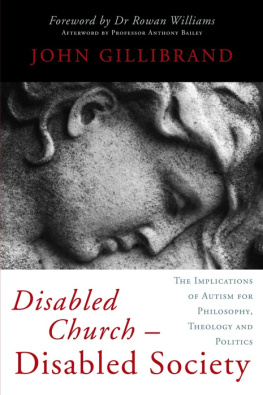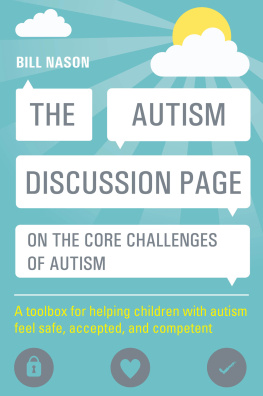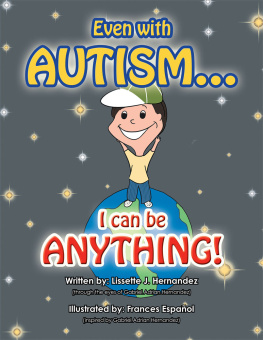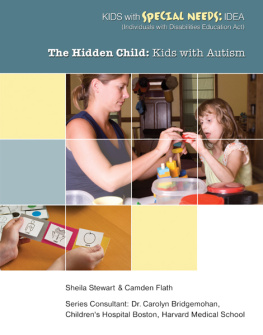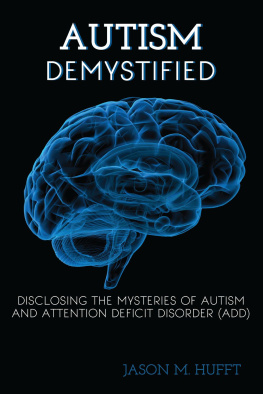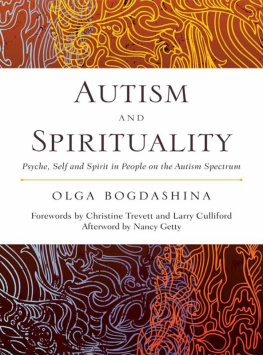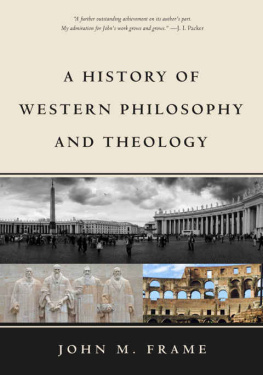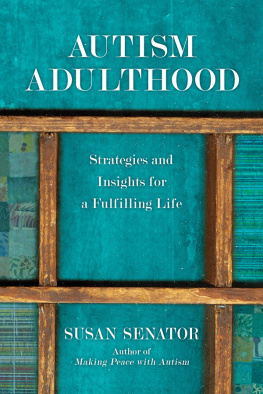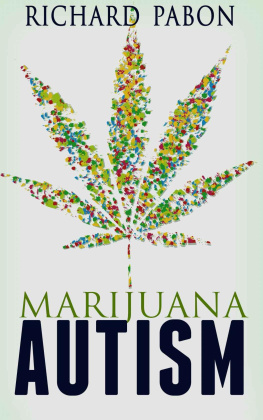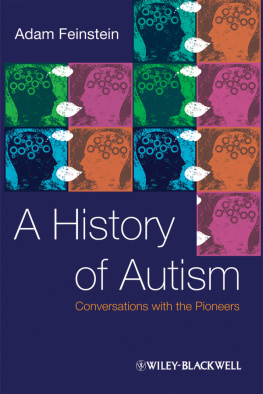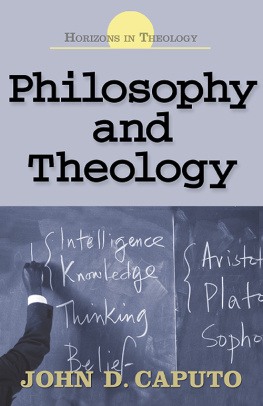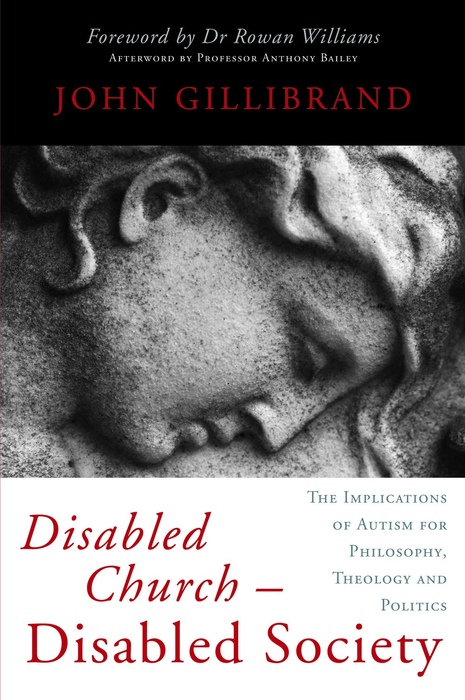Disabled Church Disabled Society
The Implications of Autism for Philosophy, Theology and Politics
John Gillibrand
Foreword by Dr Rowan Williams
Afterword by Professor Anthony Bailey
Jessica Kingsley Publishers
London and Philadelphia
First published in 2010
by Jessica Kingsley Publishers
116 Pentonville Road
London N1 9JB, UK
and
400 Market Street, Suite 400
Philadelphia, PA 19106, USA
www.jkp.com
Copyright John Gillibrand 2010
Foreword copyright Rowan Williams 2010
Afterword copyright Anthony Bailey 2010
All rights reserved. No part of this publication may be reproduced in any material form (including photocopying or storing it in any medium by electronic means and whether or not transiently or incidentally to some other use of this publication) without the written permission of the copyright owner except in accordance with the provisions of the Copyright, Designs and Patents Act 1988 or under the terms of a licence issued by the Copyright Licensing Agency Ltd, Saffron House, 610 Kirby Street, London EC1N 8TS. Applications for the copyright owners written permission to reproduce any part of this publication should be addressed to the publisher.
Warning: The doing of an unauthorised act in relation to a copyright work may result in both a civil claim for damages and criminal prosecution.
Library of Congress Cataloging in Publication Data
A CIP catalog record for this book is available from the Library of Congress
British Library Cataloguing in Publication Data
A CIP catalogue record for this book is available from the British Library
ISBN 978 1 84310 968 6
eISBN 978 0 85700 361 4
Converted to eBook by EasyEPUB
To Gillian
who bore the burden and the heat of the day
Charity [Love] is the power to accept, to accept ourselves and other people and the world as the presence of God. Charity is the power not to deny but to affirm experience, not to shrink away from it in frozen or indignant alarm but to go out and meet it, because, in spite of the apparent threats and dangers, it is our creator, come not to steal, not to kill, not to destroy, but that we might have life, and have it more abundantly.
Harry Williams (from The True Wilderness A Selection of Addresses, Constable, 1965)
What is the point of striving after knowledge if it only ensures the acquisition of knowledge and not in a certain way, and to the greatest extent possible, the disorientation of he who knows? What is philosophy today I mean philosophical activity if not the critical work of thought upon thought, if it does not, rather than legitimising what one already knows, consist of an attempt to know how, and to what extent it is possible to think differently.
Michel Foucault (from the introduction to The Use of Pleasures, Gallimard, 1984)
Autism is a disorder which fascinates because it seems to be so essentially a disorder of the human condition.
Francesca Happ (Autism An Introduction to Psychological Theory, UCL Press, 1994)
Foreword
This is a book about living at the edge of what makes sense. It is first and foremost a book about the experience of living in a situation that doesnt submit to the ordinary expectations of what can be managed and understood the situation of parenting a child at the most challenging place in the autistic spectrum, with all the cost and stress this entails and all hard learning it brings. But it opens out from this into a wider reflection on making sense and failing to make sense. John Gillibrand observes with exceptional and uncomfortable clarity how much of our language about human dignity and human value still carries a coded assumption about what a human being really is, and how heavy the strain ought to be on such language when we are engaged with a person who simply does not relate in the ways we commonly think about as standard. What if we are involved with a person who does not and cannot use language to define himself or herself? with a person who cant be said to be responding to emotional stimuli in any ways we can recognize? with a person who cannot with any credibility be said to be defined by conscious relations within a community? What is the appropriate response as we try to think of what is due to such a person in terms of rights and entitlements?
In the course of raising these questions, John directs some sharp challenges to both political and religious rhetoric. He is claiming, I think, that refusing to accept our failure to make sense is what most damages our thinking and feeling about people like his son, Adam. Theologically and socially, we want to contain this threatening experience, to reduce people living with autism to problems to be managed; and so much of the language of the Church which John serves faithfully as a priest seems to take for granted things about relationship and community and speech that simply dont apply to his son, so that there is a constant, unspoken conspiracy of exclusion. What is powerful in these pages is that he does not offer a programme of rival solutions but only the invitation to let yourself be silenced by the puzzles and imaginative or intellectual brick walls that are recognized here.
But this is not a recommendation of passivity. The anger in this book is not only about religious insensitivity or social nervousness and avoidance. It is very profoundly about the loss of political nerve in a cultural climate that has made the whole enterprise of care so marginal to its concerns, and now seems unable to accept that it has come to the end of its resources in terms of capacity to fix things, economically, socially and environmentally. The imperative to address the priority of care afresh with proper seriousness just might be felt more acutely in this situation of losing the power to make sense in the ways we once took for granted so that this just might turn out to be a moment of grace after all. And at the most fundamental level of all, the summons is to let go of the patronizing downward look at those who are different; John is not afraid of making the connection between attitudes to autism and the Churchs confusion and fear around sexual minorities. The sense, the meaning, that matters is ultimately made when we acknowledge that the others situation is our own, that there is no tidy frontier between the world in which we are in charge as makers of sense and the world of those poor unfortunates who cant make sense or make the wrong kind of sense. In them, it is us that we all see, he writes; we are all faced with senselessness, and we find a properly human meaning when we face that truth before the unnameable God and the failed and crucified saviour.
Combining poignant personal honesty with an extraordinarily wide range of theological and philosophical learning, John Gillibrand has written a book that takes us well beyond the usual boundaries of studies in autism to raise questions about our human identity, suggesting that we jeopardize human dignity most when we try to bind it to the characteristics we can recognize and value and understand as mirroring only our own faces. The harder labour is seeing ourselves in the person who is genuinely and painfully other; and this is what John and Gill have seen as their calling in discovering how to be parents to Adam. I am grateful that they have shared with us what this calling means through these searching and moving pages.

